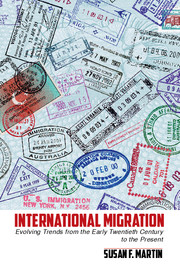Book contents
- Frontmatter
- Contents
- Foreword
- Acknowledgments
- List of Acronyms
- Introduction
- 1 Early Roots
- 2 “The Problem of Refugees”
- 3 Labor Mobility
- 4 Orderly and Humane Migration Management
- 5 Trafficking in Persons
- 6 Migration and International Security
- 7 Migration, the Environment, and Climate Change*
- 8 Migration and Development
- 9 Towards the Future
- Bibliography
- Index
Introduction
Published online by Cambridge University Press: 05 August 2014
- Frontmatter
- Contents
- Foreword
- Acknowledgments
- List of Acronyms
- Introduction
- 1 Early Roots
- 2 “The Problem of Refugees”
- 3 Labor Mobility
- 4 Orderly and Humane Migration Management
- 5 Trafficking in Persons
- 6 Migration and International Security
- 7 Migration, the Environment, and Climate Change*
- 8 Migration and Development
- 9 Towards the Future
- Bibliography
- Index
Summary
States have long been wary of putting international migration on the global agenda. As an issue that defines sovereignty – that is, who enters and remains on a state's territory – international migration has called for protection of national prerogatives and unilateral action. Only in the area of refugee movements, and more recently human smuggling and trafficking in persons, have many governments agreed to binding international laws and norms. Destination countries in particular have been reluctant to engage in multilateral discussions of labor migration, fearing that irreconcilable differences would develop between themselves and source countries, thereby inflaming tensions. Nor have they been willing to establish a single intergovernmental organization with responsibilities for labor migration within or associated with the UN structure.
This book examines the progress (or lack thereof) in developing an international migration “regime.” It adopts the definition of international regimes as “principles, norms, rules, and decision-making procedures” that facilitate a convergence of expectations among states (Krasner 1983:1). As Krasner (1983:7) explains, “In a world of sovereign states the basic function of regimes is to coordinate state behavior to achieve desired outcomes in particular issue-areas.” The book assesses two facets of international regimes: (1) mechanisms for interstate cooperation in responding to and managing an area of common interest, and (2) the emergence of international organizations to support state initiatives.
- Type
- Chapter
- Information
- International MigrationEvolving Trends from the Early Twentieth Century to the Present, pp. 1 - 25Publisher: Cambridge University PressPrint publication year: 2014

